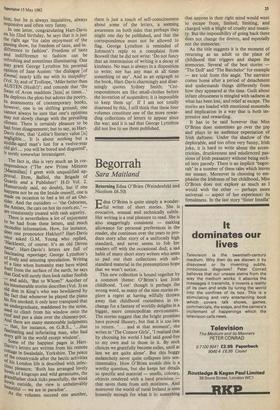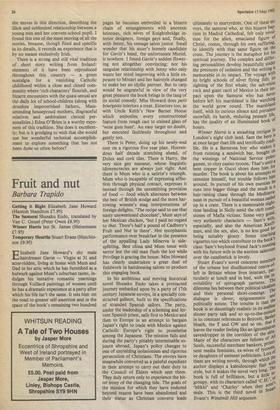Begorrah
Sara Maitland
L' dna O'Brien is quite simply a wonder- ful writer of short stories. She is evocative, sensual and technically subtle. Her writing is a real pleasure to read. She is also staggeringly consistent — making allowance for personal preferences in the reader, she continues over the years to pro- duce story after story of a uniformly high standard, and never seems to fob her readers off with the occasional dud; a sad habit of many short story writers who seem to pad out their collections with sub- standard material in the presumptious hope that we won't notice.
This new collection is bound together by a common theme: O'Brien's lost Irish childhood. 'Lost' though is perhaps the wrong word, as many of the nine stories ex- plore a regret at having wilfully thrown away that childhood rootedness in ex- change for a fantasy of worldly delights in a bigger, more cosmopolitan environment. The stories suggest that the bright promises have proved illusory, but that it is too late to return. ... and at that moment', she writes in 'The Connor Girls', 'I realised that by choosing his world I had said good-bye to my own and to those in it. By such choices we gratefully become exiles, until at last we are quite alone'. But this boggy melancholy never quite collapses into sen- timentality. How O'Brien avoids this is a worthy question, but she keeps her details so specific and material — smells, colours, objects rendered with a hard precision that saves them from soft mistiness. And moreover the world of rural Ireland is seen honestly enough for what it is: something
that anyone in their right mind would want to escape from, limited, limiting, and charged with a blight of cruelty and insani- ty. But the impossibility of going back there does not change the desires, and especially not the memories.
As the title suggests it is the moment of returning as an adult to the place of childhood that triggers and shapes the memories. Several of the best stories 'The Doll' and 'The Batchelor' for example — are told from this angle. The narrator comes home after a period of detachment and understands things differently from how they appeared at the time. Guilt about infant obtuseness is mingled with sadness at what has been lost, and relief at escape. The stories are loaded with emotional ennuendo and implication in a way that is both im- pressive and rewarding.
It has to be said however that Miss O'Brien does sometimes go over the top and plays to an audience expectation of Irish daftness. Under the shadow of the deplorable, and too often very funny, Irish joke, it is hard to write about the eccen- tricities, drunkenness and misdirected pas- sions of Irish peasantry without being suck- ed into parody. There is an implicit 'begor- rah' in a number of these tales which leaves me uneasy. Moreover in choosing to em- phasise the Irishness of her childhood, Miss O'Brien does not explore as much as I would wish the other — perhaps more universal — aspect of her experience: its femaleness. In the last story 'Sister 'media' she moves in this direction, describing the illicit and sublimited relationship between a young nun and her convent-school pupil. I found this one of the most moving of all the stories, because, though fixed and specific in its details, it records an experience that is by no means exclusively Irish.
There is a strong and still vital tradition of short story writing from Ireland: elements of it have been reproduced throughout this country — a green nostalgia for a vanishing Catholic childhood within a close and closed com- munity where 'rich characters' flourish, and bizarre encounters with the quasi-sexual are the daily lot of school-children (along with drunken impoverished fathers, Mass- attending houseproud mothers, disgraceful relatives and ambivalent clerical per- sonalities.) Edna O'Brien is a worthy expo- nent of this tradition. She does it excellent- ly; but is it grudging to wish that she would use her wonderful technical accomplish- ment to explore something that has not been done so often before?







































 Previous page
Previous page